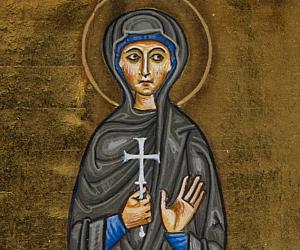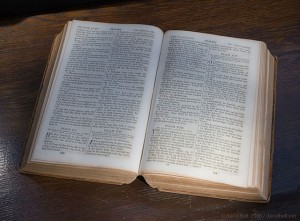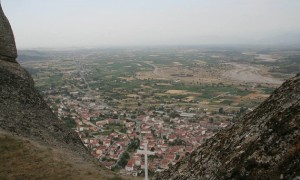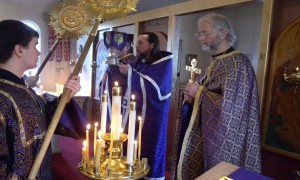The God of the New Testament in the Old Testament (part 4)
1 May 2017“As the flame blazed up from the altar toward heaven, the angel of the Lord ascended in the flame. Seeing this, Manoah and his wife fell with their faces to the ground. When the angel of the Lord did not show himself again to Manoah and his wife, Manoah realised that it was the angel of the Lord. “We are doomed to die!” he said to his wife. “We have seen God!” (Judges 13:20-22)
In my previous article, The Burning Bush, we examined the manifestation of the “Angel of the Lord” or the “Angel of Great Counsel” in the Burning Bush onMount Sinai. As we saw, when this particular ‘angel’ appears, He declares Himself as God, “I am the God of your fathers” (Exodus 3:6), and yet also speaks as though subordinate to God. The reason is that the Angel of the Lord is the Son of God, fully God and yet subordinate and obedient to the Father. In this article we will look at other manifestations of the Angel of the Lord, also referred to in some places as the Angel of God (Genesis 31:11; Exodus 14:9), the Angel of His Presence (Isaiah 63:9), and the God of Bethel (Genesis 31:11-13).
The accounts of the appearances of the really speak for themselves. It is abundantly clear in the cited passages that follow that the Angel of the Lord is God Himself, and yet He is the Angel (messenger) of the Lord because He is not the Father, but the Son. Let us begin with the appearance of the Angel to Hagar.
Hagar and the Angel
(Genesis 16):
“The angel of the Lord found Hagar near a spring in the desert; it was the spring that is beside the road to Shur. And he said, “Hagar, slave of Sarah, where have you come from, and where are you going?” “I’m running away from my mistress Sarah,” she answered. Then the angel of the Lord told her, “Go back to your mistress and submit to her.” The angel added, “I will increase your descendants so much that they will be too numerous to count.” The angel of the Lord also said to her: “You are now pregnant and you will give birth to a son. You shall name him Ishmael,for the Lord has heard of your misery…” She gave this name to the Lord who spoke to her: “You are the God who sees me,” for she said, “I have now seenthe One who sees me.”
If the Angel of the Lord is merely one of the heavenly court, why are we told that Hagar gave the name “You are the God who sees me” to “the Lord who spoke to her”? And why would she say, “I have now seen the One who sees me”? Hagar clearly perceived in the Angel the Lord God Himself.
Jacob’s reaction to the Angel of the Lord is similar:
Jacob and the Angel
(Genesis 32):
“So Jacob went on his way, and the angels of God met him…And he arose that night and took his two wives, his two female servants, and his eleven sons, and crossed over the ford of Jabbok. He took them, sent them over the brook, and sent over what he had. Then Jacob was left alone; and a Man wrestled with him until the breaking of day. Now when He saw that He did not prevail against him, He touched the socket of his hip; and the socket of Jacob’s hip was out of joint as he wrestled with Him. And He said, “Let Me go, for the day breaks.” But he said, “I will not let You go unless You bless me!” So He said to him, “What is your name?” He said, “Jacob.” And He said, “Your name shall no longer be called Jacob, but Israel; for you have struggled with God and with men, and have prevailed.” Then Jacob asked, saying, “Tell me Your name, I pray.” And He said, “Why is it that you ask about My name?” [compare Exodus 3:14 and Judges 13:18] And He blessed him there. So Jacob called the name of the place Penuel:“For I have seen God face to face, and my life is preserved.”
Note the Angel’s reaction when Jacob asks for His name: “Why is it that you ask about My name?” This reluctance to disclose His name is reminiscent of God’s response to Moses onMount Sinai: “I am the living one”. “You shall say… “The Living One has sent me to you” (Exodus 3:14 [LXX]). The Angel responds in the same way in Judges 13:18: “Why do you ask about my name? It is beyond understanding”.
Furthermore, Jacob called the place Penuel, which means ‘the face of God’, because he believed that in this Angel He had seen God face to face, and was amazed that he had lived to tell the tale.
Manoah and his wife and the Angel
(Judges 13):
“The angel of the Lord appeared to her and said, “You are barren and childless, but you are going to become pregnant and give birth to a son. Now see to it that you drink no wine or other fermented drink and that you do not eat anything unclean. You will become pregnant and have a son whose head is never to be touched by a razor because the boy is to be a Nazirite, dedicated to God from the womb. He will take the lead in delivering Israelfrom the hands of the Philistines.” Then the woman went to her husband and told him, “A man of God came to me. He looked like an angel of God, very awesome. I didn’t ask him where he came from, and he didn’t tell me his name. But he said to me, ‘You will become pregnant and have a son…’ Then Manoah prayed to the Lord: “Pardon your servant, Lord. I beg you to let the man of God you sent to us come again to teach us how to bring up the boy who is to be born.” God heard Manoah, and the angel of God came again to the woman while she was out in the field; but her husband Manoah was not with her. The woman hurried to tell her husband, “He’s here! The man who appeared to me the other day!” Manoah got up and followed his wife. When he came to the man, he said, “Are you the man who talked to my wife?” “I am,” he said. So Manoah asked him, “When your words are fulfilled, what is to be the rule that governs the boy’s life and work?” The angel of the Lord answered, “Your wife must do all that I have told her. She must not eat anything that comes from the grapevine, nor drink any wine or other fermented drink nor eat anything unclean. She must do everything I have commanded her.” Manoah said to the angel of the Lord, “We would like you to stay until we prepare a young goat for you.” The angel of the Lord replied, “Even though you detain me, I will not eat any of your food. But if you prepare a burnt offering, offer it to the Lord.” (Manoah did not realise that it was the angel of the Lord.) Then Manoah inquired of the angel of the Lord, “What is your name, so that we may honour you when your word comes true?” He replied, “Why do you ask my name? It is beyond understanding.” Then Manoah took a young goat, together with the grain offering, and sacrificed it on a rock to the Lord. And the Lord did an amazing thing while Manoah and his wife watched: As the flame blazed up from the altar toward heaven, the angel of the Lord ascended in the flame. Seeing this, Manoah and his wife fell with their faces to the ground. When the angel of the Lord did not show himself again to Manoah and his wife, Manoah realised that it was the angel of the Lord. “We are doomed to die!” he said to his wife. “We have seen God!”
Manoah at first believed that the Angel of the Lord was just a man, perhaps an angel or a prophet of God, but after the Angel ascends into the flame, he and his wife fall to the ground in fear and awe, and Manoah exclaims, “We have seen God!”, and like Jacob, associates seeing God with death. This is reminiscent of God’s words to Moses in Exodus. “You cannot see my face, for no one can see me and live… you will see my back; but my face must not be seen.” (33:20, 23). The accounts of the Angel’s appearance to Moses on Sinai suggest that the difference between Moses’ encounter with God and that of others who see the Angel of the Lord is that on Sinai Moses sees the Word of God “uncloaked” as it were, and so does not permit Moses to see His face in order to preserve his life. God appeared in different forms, as a man or as an angel, in order that those who see Him would not die or be blinded by the sight of His glory.
The account of the appearance of the Angel to Gideon is almost identical to that of Manoah and his wife:
The Angel and Gideon
(Judges 6):
“The angel of the Lord came and sat down under the oak in Ophrah that belonged to Joash the Abiezrite, where his son Gideon was threshing wheat in a winepress to keep it from the Midianites. When the angel of the Lord appeared to Gideon, he said, “The Lord is with you, mighty warrior.” “Pardon me, my lord,” Gideon replied, “but if the Lord is with us, why has all this happened to us? Where are all his wonders that our ancestors told us about when they said, ‘Did not the Lord bring us up out of Egypt?’ But now the Lord has abandoned us and given us into the hand of Midian.” The Lord turned to him and said, “Go in the strength you have and save Israelout of Midian’s hand. Am I not sending you?” “Pardon me, my lord,” Gideon replied, “but how can I save Israel? My clan is the weakest in Manasseh, and I am the least in my family.” The Lord answered, “I will be with you, and you will strike down all the Midianites, leaving none alive.” Gideon replied, “If now I have found favour in your eyes, give me a sign that it is really you talking to me. Please do not go away until I come back and bring my offering and set it before you.” And the Lord said, “I will wait until you return.” Gideon went inside, prepared a young goat, and from an ephah of flour he made bread without yeast. Putting the meat in a basket and its broth in a pot, he brought them out and offered them to him under the oak. The angel of God said to him, “Take the meat and the unleavened bread, place them on this rock, and pour out the broth.” And Gideon did so. Then the angel of the Lord touched the meat and the unleavened bread with the tip of the staff that was in his hand. Fire flared from the rock, consuming the meat and the bread. And the angel of the Lord disappeared. When Gideon realized that it was the angel of the Lord, he exclaimed, “Alas, Sovereign Lord! I have seen the angel of the Lord face to face!” But the Lord said to him, “Peace! Do not be afraid. You are not going to die.” So Gideon built an altar to the Lord there and called it The Lord Is Peace. To this day it stands in Ophrah of the Abiezrites”.
In Judges 2:1-3 the same Angel of the Lord declares Himself to be the same God who brought the people ofIsraelout ofEgypt:
“The angel of the Lord went up from Gilgal to Bokim and said, ‘I brought you up out ofEgyptand led you into the land I swore to give to your ancestors. I said, ‘I will never break my covenant with you, and you shall not make a covenant with the people of this land, but you shall break down their altars.’ Yet you have disobeyed me. Why have you done this? And I have also said, ‘I will not drive them out before you; they will become traps for you, and their gods will become snares to you’.”
Yet in Exodus 23:20-23, God tells the people of Israel that He is sending His angel ahead of them to guide and protect them, and says that His Name is in Him:
“Behold, I am sending an angel ahead of you to guard you along the way and to bring you to the place I have prepared. Pay attention to him and listen to what he says. Do not rebel against him; he will not forgive your rebellion, since my Name is in him. If you listen carefully to what he says and do all that I say, I will be an enemy to your enemies and will oppose those who oppose you. My angel will go ahead of you and bring you into the land of the Amorites…”
Since the Angel is God’s ‘Messenger’, the Word and Son of God, He is distinct from the person of the Father and is subordinate to Him. Thus it is characteristic that the words, “He Who sent me” are uttered by Jesus no less than 26 times in the Gospels. Yet at the same time, being the Lord God Himself, one of the Trinity, “true God from true God, begotten of the Father before all ages”, and not a created being like the angels, the Angel of the Lord frequently declares Himself as God, and receives worship and sacrifices.
That the Angel of the Lord is the Pre-Incarnate Christ is stated not only by individual Church Fathers, but also by an ancient synod of the Church, in a Creedal Statement by the Synod of Antioch in 268/9. This is the earliest surviving synodical statement on Old Testament Christology:
“The Son was not just a spectator nor was he merely present, but… came down and appeared to Abraham “at the oak of Mamre”, [as] one of the three, with whom the patriarch conversed as Lord and Judge… This is who, fulfilling the Fathers will, appears to and converses with the patriarchs… sometimes as an Angel, at other times as Lord, and at other times being testified to as God. Truly it is impious to suppose that one can call the God of all an angel; however the Angel of the Father is the Son, he is Lord and God, for it is written: “His name will be called the Angel of Great Council”. For… it is written: “God tested Abraham, and said to him, ‘Abraham! Abraham!’ And he said, ‘Here I am.’ Then He said, ‘Take now your beloved Son’” etc. And again: “And the Angel of the Lord called to him and said, ‘Abraham! Abraham!’” etc. “‘For now I know that you fear God, since for My sake you have not spear your beloved son… and he called the name of the place ‘The-Lord-Has-Appeared’; as it is said to this day, ‘In the mountain the Lord was seen’”.
And concerning Jacob: “‘the Angel of God’”, [Jacob] says, “spoke to me in a dream, saying, ‘Jacob’. Thus I said, ‘what is it’. So he said, ‘lift up your eyes’” etc. “I am the God who appeared to you at the ‘Place-of-God’, where you anointed the pillar and made a vow to Me”… “So Jacob called the name of that place ‘The Form of God’; ‘For I saw God face to face, and my soul was saved’”…
But truly the Law was also in a similar manner, we say, given to Moses through the ministry of the Son of God; as the Apostle, teaching [us], says: “What purpose then does the law serve? It was added because of transgressions, till the Seed should come to whom the promised was made; and it was appointed through angels by the hand of a mediator”. Verily we do not know of another mediator between God and men apart from Him. But we are also taught these things by Moses: “Then the Angel appeared to him in a flame of fire from the midst of the bush” etc…
This is who, speaking the truth, says: “Not that anyone has seen the Father, except He who is from the Father; He has seen the Father”. And in the same Gospel: “You have neither heard His voice at any time, nor seen His form”, and: “No one has seen God at any time. The only begotten Son, who is in the bosom of the Father, He has declared Him”. The Apostle says of Him: “He is the image of the invisible God”, and in another place he says: “To the King eternal, incorruptible, invisible, to God who alone is wise, be honour and glory to the ages of ages. Amen.”… The Son however, being with the Father, is indeed God and Lord of all things made, yet he was sent by the Father from the heavens, and was made flesh, becoming man”. (Translation by Rev. Michael S. Spanou)
There can be no doubt from the passages cited above that those who see the Angel believe they have seen God. Even in the Old Testament, there is a plurality of persons in the Godhead: “I appealed to the Lord, the Father of my Lord, not to forsake me in the days of affliction, at the time when there is not help against the proud” (Wisdom of Sirach 51:10); “The Lord said to my Lord, ‘Sit at my right hand, till I make your enemies your footstool’.” (Psalm 109:1 [LXX]) Thus it is characteristic that the Greek Fathers interpret God’s words in Genesis 1:26, “Let us make man in our image and after our likeness” as the three persons of the Trinity speaking together. Moreover, the Hebrew words for God, “Elohim”, and Lord, “Adonai”, are plural, not singular. Thus it should not take us by surprise that the Israelites perceive God Himself in a person known and described as an “angel” or “messenger” of the Lord.
Thus when we read the Old Testament in light of Greek patristic thought and in the greater context of scripture, we can only conclude that the Angel of the Lord is indeed the Son and Word of God, “true God from true God”. He is “with God” and yet “is God” (John 1:1). “And his name is called the Angel of Great Counsel” (Isaiah 9:6 LXX]).














